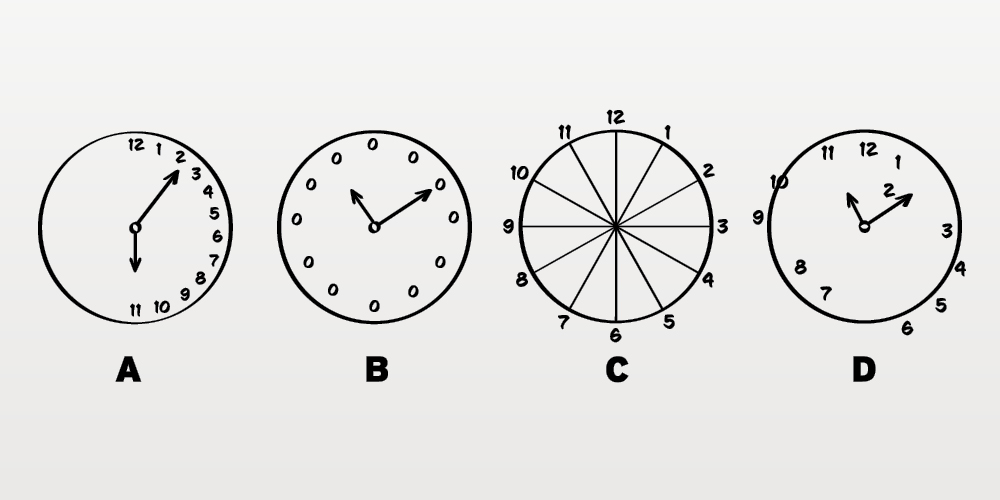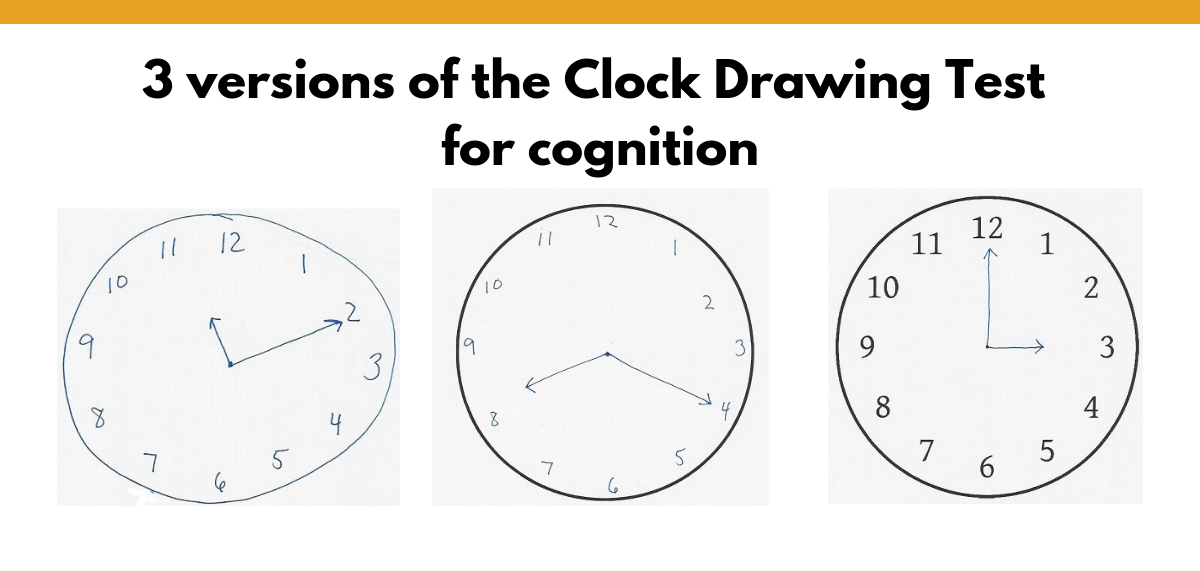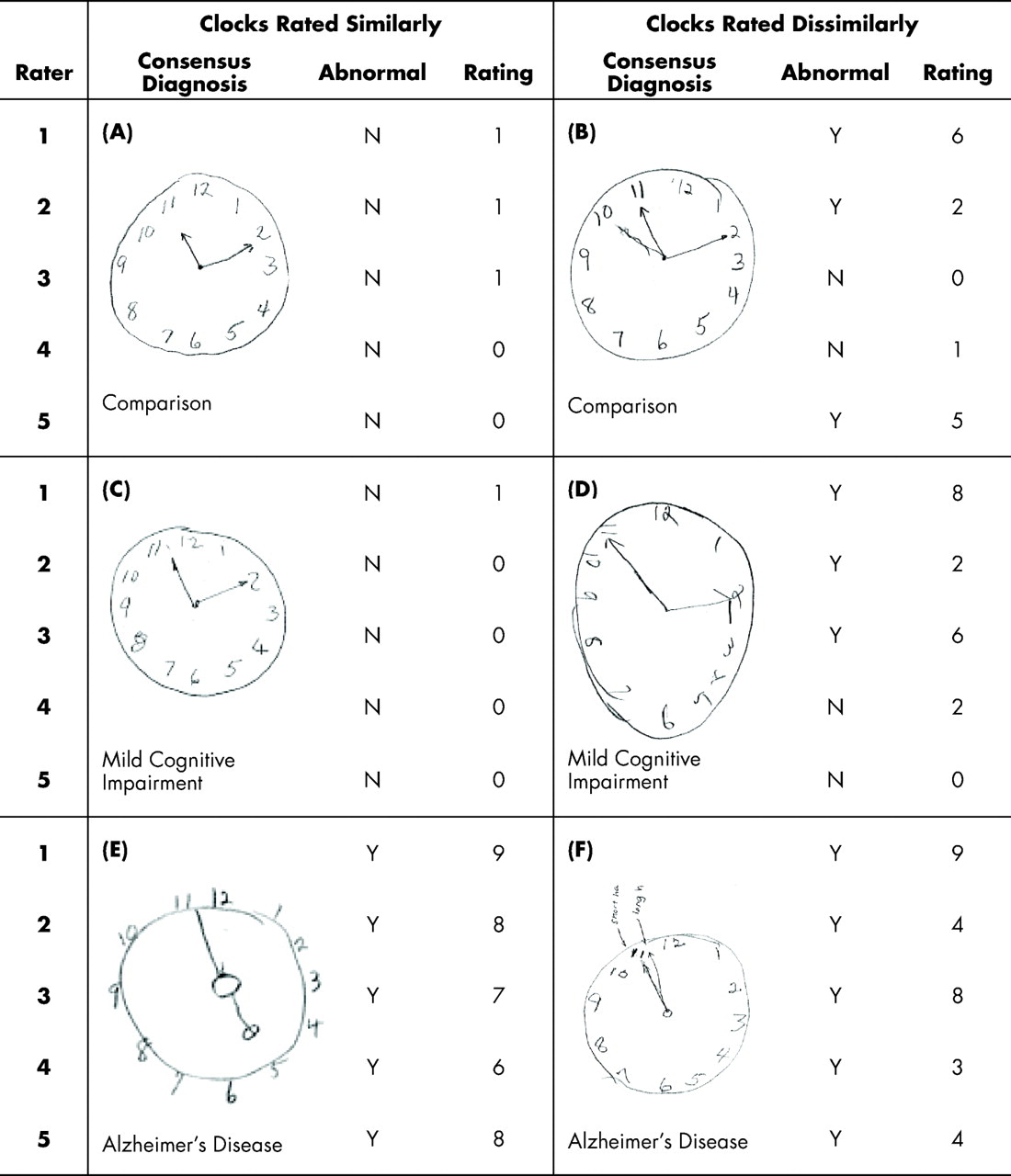Clock Drawing Test Interpretation
Clock Drawing Test Interpretation - Instruct patient to draw numbers in the circle to make the circle look like the face of a clock and then draw the hands of the clock to read 10. Web don't interpret your own test, find out why professional interpretation is important. The clock drawing test is a cognitive test that evaluates how well the brain is working. The test typically consists of two phases: Web the clock drawing test (cdt) is a simple neuropsychometric instrument that can be easily applied to assess several cognitive functions. Our study includes a comparison of three. Web instructions for the clock drawing test: It is also less affected by language, culture, and education than many other tests. Indicate the top of the page. Detect early signs of dementia. How you can use the clock drawing test (cdt) you can use the cdt as an assessment tool, an educational tool, a monitoring tool, and a planning tool. Instruct patient to draw numbers in the circle to make the circle look like the face of a clock and then draw the hands of the clock to read 10. The cdt. It is also less affected by language, culture, and education than many other tests. Web scoring consists of the evaluation of errors and/or distortions in the form of omissions of numbers and error in their placement such as perseverations, transpositions and spacing (mcdowell & newell, 1996). Instruct patient to draw numbers in the circle to make the circle look like. Web instructions for the clock drawing test: It takes less than a minute to do, and since it taps into many cognitive functions (e.g., planning, organization, attention, visuospatial function, memory, language), you can get a lot of information from it. On a separate sheet, patients then copy a. The inability to draw a normal clock can be a sign of. 1 he categorized five types of errors in addition to size of the clock ( figure 1 ): Web the clock draw test (cdt) is a simple but effective way to assess your brains ability to plan and reason, because these are required to draw a normal clock. Cdt is widely used in neuropsychology and related areas for the assessment. Cdt is widely used in neuropsychology and related areas for the assessment of neurological and cognitive impairments, such as alzheimer’s and other types of dementias. Our study includes a comparison of three. Web the clock drawing test (cdt) is a simple neuropsychometric instrument that can be easily applied to assess several cognitive functions. 4) spatial and/or planning deficit; Behavioral performance. The clock drawing test is a cognitive test that evaluates how well the brain is working. Web scoring consists of the evaluation of errors and/or distortions in the form of omissions of numbers and error in their placement such as perseverations, transpositions and spacing (mcdowell & newell, 1996). Cdt is widely used in neuropsychology and related areas for the assessment. Web scoring consists of the evaluation of errors and/or distortions in the form of omissions of numbers and error in their placement such as perseverations, transpositions and spacing (mcdowell & newell, 1996). Over the past 20 years, the cdt has aroused considerable interest in its role for the early screening of cognitive impairment, especially in dementia. Indicate the top of. How you can use the clock drawing test (cdt) you can use the cdt as an assessment tool, an educational tool, a monitoring tool, and a planning tool. Cdt is widely used in neuropsychology and related areas for the assessment of neurological and cognitive impairments, such as alzheimer’s and other types of dementias. 1 he categorized five types of errors. Reading clocks requires you to interpret the placement of the hands on a clock and the time they are meant to represent. Web clock drawing test interpretation system. However, it lacks sensitivity for the diagnosis of early or mild dementia. 4) spatial and/or planning deficit; Detect early signs of dementia. What is the clock drawing test? Reading clocks requires you to interpret the placement of the hands on a clock and the time they are meant to represent. Indicate the top of the page. Web clock drawing test interpretation system. How you can use the clock drawing test (cdt) you can use the cdt as an assessment tool, an educational. However, a few additional straightforward tests might be really illustrative. Our study includes a comparison of three. Web the clock drawings of an ethnolinguistically and educationally diverse sample (n = 536) were analyzed for the association of 24 different errors with the presence and severity of dementia defined by independent research criteria. However, it lacks sensitivity for the diagnosis of early or mild dementia. It takes less than a minute to do, and since it taps into many cognitive functions (e.g., planning, organization, attention, visuospatial function, memory, language), you can get a lot of information from it. Several different cdt scoring methods have been developed, but no consensus has been reached regarding which scoring method is the most accurate. Web the clock draw test (cdt) is a simple but effective way to assess your brains ability to plan and reason, because these are required to draw a normal clock. The clock drawing test is a cognitive test that evaluates how well the brain is working. Instruct patient to draw numbers in the circle to make the circle look like the face of a clock and then draw the hands of the clock to read 10. Web the clock drawing test (cdt) is a simple neuropsychometric instrument that can be easily applied to assess several cognitive functions. How you can use the clock drawing test (cdt) you can use the cdt as an assessment tool, an educational tool, a monitoring tool, and a planning tool. Over the past 20 years, the cdt has aroused considerable interest in its role for the early screening of cognitive impairment, especially in dementia. Give patient a sheet of paper with a large (relative to the size of handwritten numbers) predrawn circle on it. Behavioral performance on the test has been studied extensively, but there is. It is a reliable screening tool for cognitive dysfunction, particularly for dementia. Indicate the top of the page.
Moca Scoring Nuances With Clock Draw / Frontiers Risk Factors and
Clock Drawing Test Scoring Pdf Bruin Blog

Clock Drawing Test Interpretation Pdf Tutor Suhu

Baycrest Foundation The Clock Drawing Test A Quick and Effective

Draw A Clock Test Scoring DRAW HIO

Clock Drawing Test Printable
![[PDF] Automatic interpretation of clock drawings for computerised](https://d3i71xaburhd42.cloudfront.net/51d201729721ca3d7265d51121474c68ae6616ff/75-Table4-1-1.png)
[PDF] Automatic interpretation of clock drawings for computerised
![[PDF] Clock drawing test ratings by dementia specialists interrater](https://d3i71xaburhd42.cloudfront.net/1bfb24f617e3c1db05e21639c7dc2f360e71f4e6/8-Figure1-1.png)
[PDF] Clock drawing test ratings by dementia specialists interrater

Clock Drawing Test Interpretation Pdf Tutor Suhu

Clock Drawing Test Ratings by Dementia Specialists Interrater
Web As Classically Defined By Edith Kaplan (1988), Clock Test Administration Involves First Commanding Patients To ‘Draw The Face Of A Clock With All The Numbers And Set The Two Hands To 10 After 11’.
It Is Also Less Affected By Language, Culture, And Education Than Many Other Tests.
Web The Clock Drawing Test (Cdt) Is An Inexpensive, Fast And Easily Administered Measure Of Cognitive Function, Especially In The Elderly.
Reading Clocks Requires You To Interpret The Placement Of The Hands On A Clock And The Time They Are Meant To Represent.
Related Post: